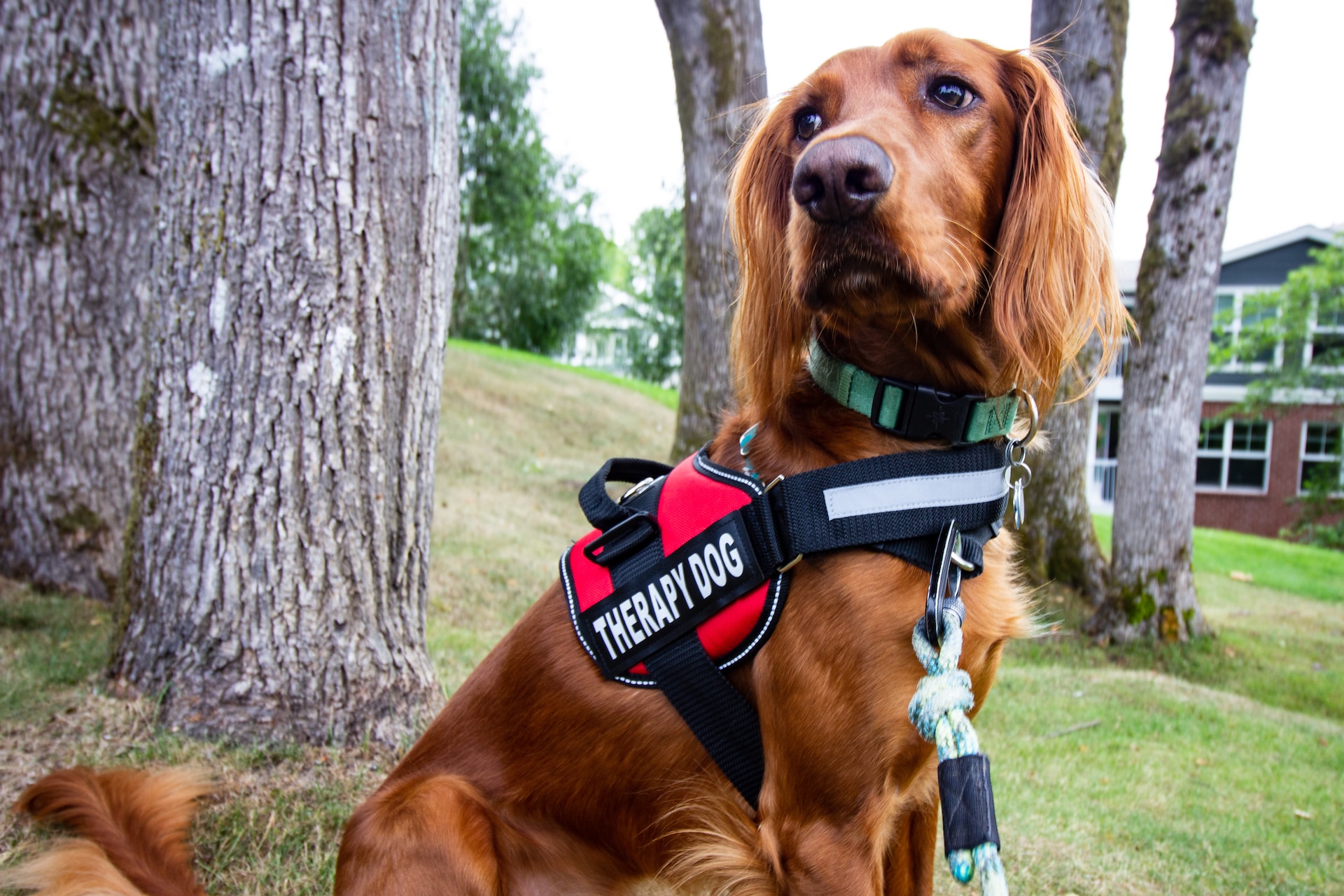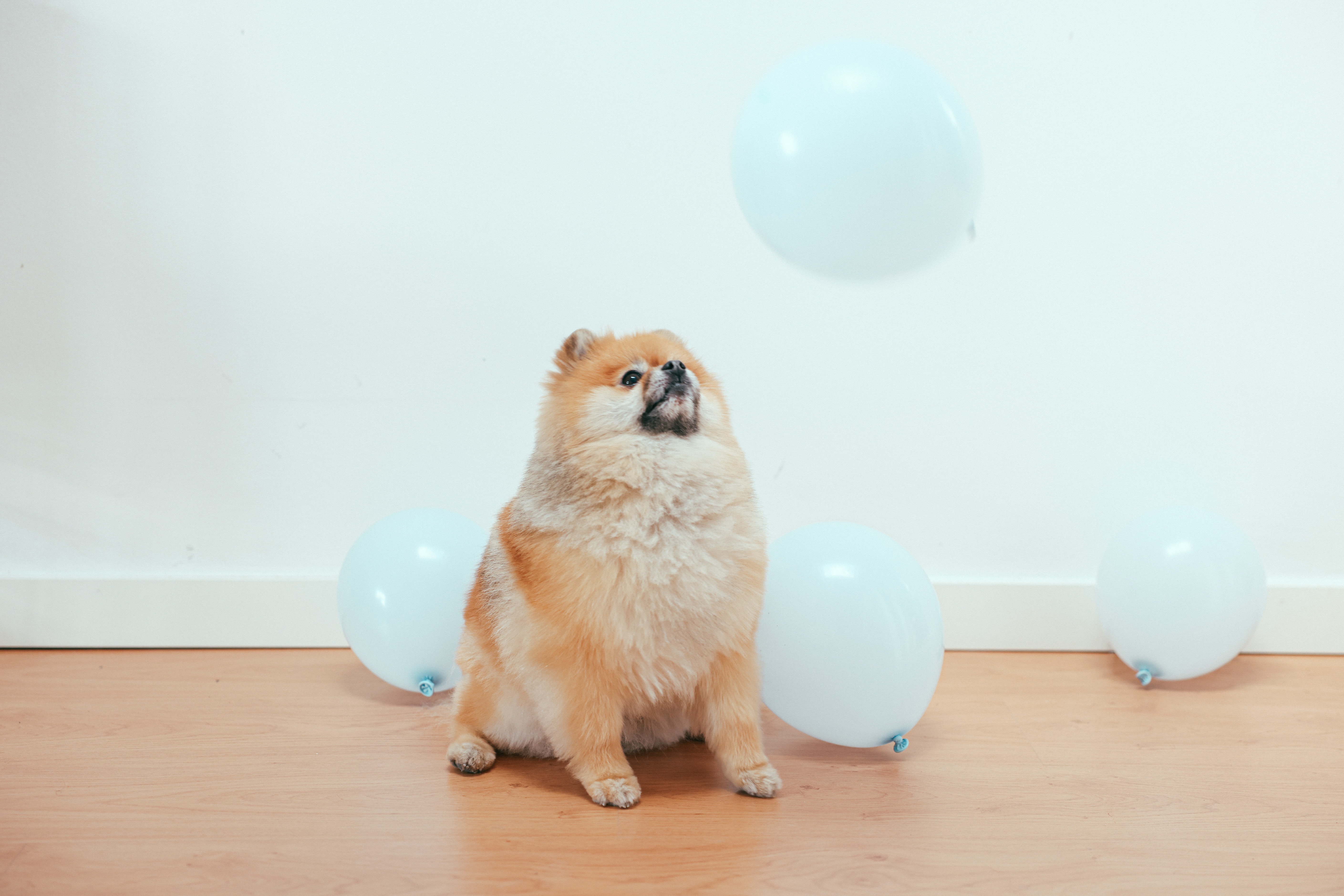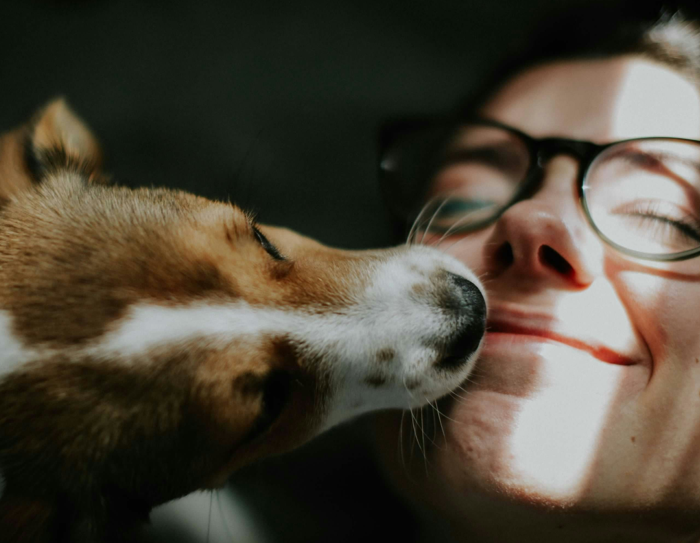
If you’ve ever been greeted by a flood of wet, enthusiastic licks from your dog, you have probably wondered what this behavior means.
Is your dog showing affection, trying to communicate something, or simply indulging in their natural instincts? The truth is, when your dog licks your face, it could be a combination of these reasons or even a little bit of both!
Let’s take a closer look at why your dog might be giving you face licks and what it really means!
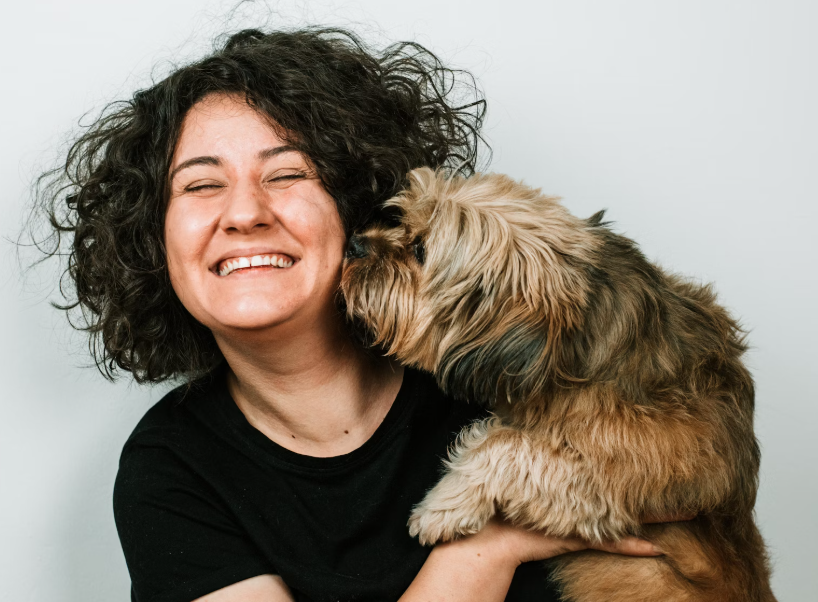
Affection and Bonding
One of the most common (and preferred by pet parents) reasons your dog licks your face is to show affection. Dogs lick to communicate warmth and love, which can be perceived as a hug or a kiss in humans.
In the wild, it’s common for dogs’ ancestors- wolves, and other canines to lick each other as a way to reinforce social bonds, especially with younger dogs licking their mother’s face for comfort and care. When your dog licks you, it may be their way of saying that they love you and are happy to see you!
What better way to be greeted after a long busy day than feeling your furry friend’s affection and seeing their big loving eyes?
The act of licking also triggers the release of endorphins in dogs, which are chemicals associated with pleasure and stress relief. That said, when your dog licks you, they might be feeling particularly content and relaxed.
Seeking Attention
Dogs are intelligent creatures who quickly learn which behaviors lead to the desired outcomes! In other words, if they receive positive responses, such as treats, hugs, or playtime, or any form of attention, they will likely repeat those behaviors in the future. Licking can be one of those behaviors that triggers a response from you.
Whether it’s a simple gesture like licking your face or hands, dogs often use licking as a way to connect with you and get a reaction. When a canine licks your face and it leads to positive reinforcement, whether that’s petting, praise, or play, they are more likely to continue licking you.
Over time, this behavior may become a learned action they associate with receiving attention, which is why it may occur frequently. Dogs are creatures of habit, and if licking gets them the response they want, they'll instinctively keep doing it as a way to engage with you.
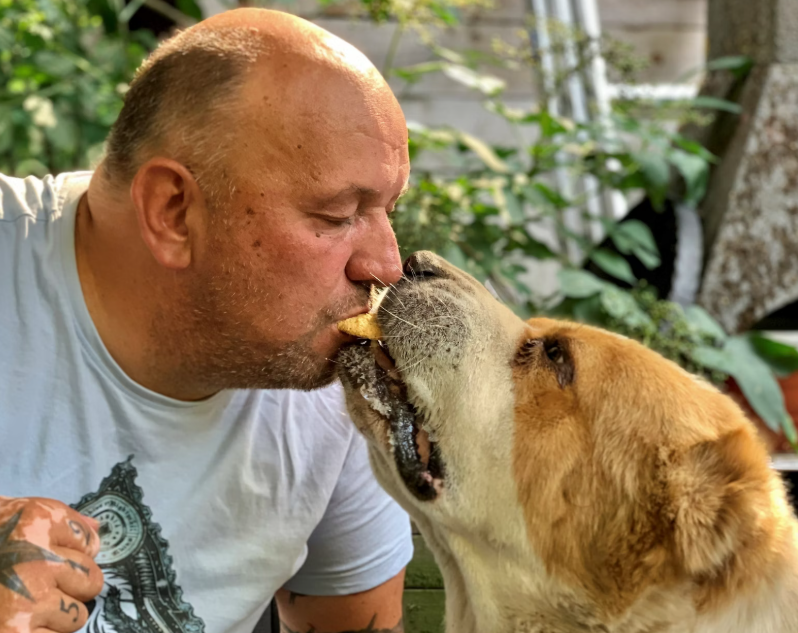
Curiosity and Exploration
Our paw friends use their sense of smell and mouths as primary ways to explore the world. Licking can be a dog’s way of investigating objects, their surroundings, and even new things—like your face! When they lick your face, it may simply be their way of learning more about you, your scent, and even your emotions.
In this case, the behavior would be more about exploration than emotional connection. Dogs have an incredibly sensitive sense of smell, so licking your face might also be a way for them to get a better sense of your mood or state of health.
You may even further shape this behavior and train your dog to give you kisses on command. However, if you are not comfortable with your face being licked, you can adapt this and teach them to lick your arm or leg instead.
Giving a kiss is a form of tactile stimulation and a common psychiatric service dog task.
Comfort and Reassurance
For some dogs, licking is a self-soothing mechanism. Similar to some people who bite their nails or make restless movements when stressed, dogs may lick to calm themselves down.
If your dog licks your face when they’re anxious or in an unfamiliar situation, it may be a sign that they’re seeking reassurance from you. In this case, the licking can be a comforting action that helps them feel more secure.
If you notice that your paw friend tends to lick when stressed and in unknown environments, you may want to address the triggers. Through desensitization and counter-conditioning, you can help them change their attitude toward the stimuli.
Taste and Salt
Dogs have a great sense of taste, although not as finely tuned as ours. While humans have around 9,000 taste buds, dogs have about 1,700. Despite this, they can still detect a wide range of flavors, including sweet, sour, salty, and bitter, much like we do. Taste buds are distributed across different parts of the tongue, and each one is specialized to respond to specific molecules in food.
You may want to know that dogs also have special taste buds that are designed to detect water, which helps them stay hydrated. Interesting, right?
A common reason for your dog to lick your face is the attraction to the salty taste on your skin. After a long day of physical activity, whether it’s work, play, or exercise, your body produces sweat and natural oils. These substances contain trace amounts of salt, which can be especially appealing to your dog’s taste buds. In hot weather, when your skin is sweatier, your dog may be even more drawn to the salty areas, particularly around your face.
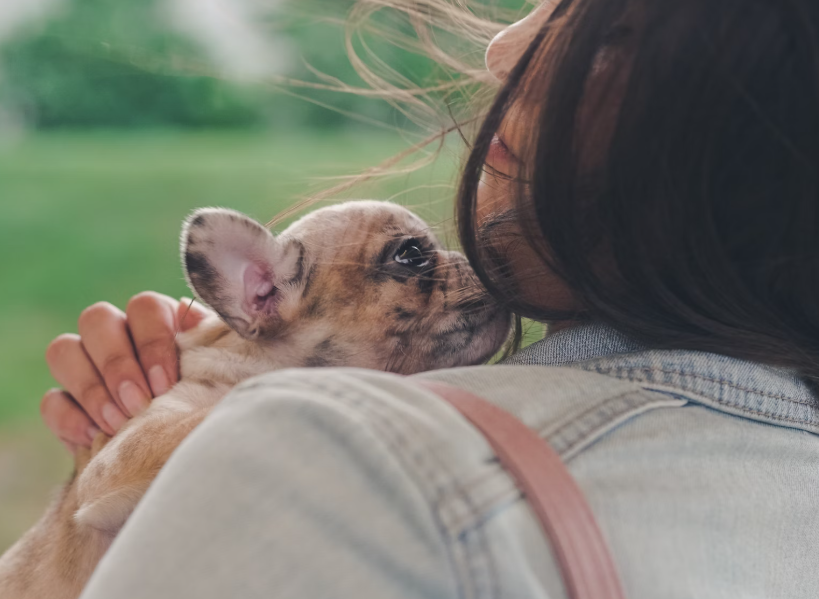
Social Behavior and Communication
In the dog world, licking is often used as a way to communicate. In packs, ‘lower-ranking’ dogs lick ‘higher-ranking’ ones as a sign of submission. This is a way of showing respect and deference. When your dog licks your face, it might be acknowledging you as the "alpha" of the pack and signaling that they see you as the leader.
Licking can also be a way for your dog to show acknowledgment, especially if they are trying to avoid tension or get your approval. If your furry friend feels uncertain or is trying to avoid a confrontation, they might lick your face as a way to signal submission.
Health Check
Sometimes, face-licking may have a more practical purpose, especially if your dog is trying to get your attention about something. If they are licking your face with more intensity or frequency than usual, it might be a sign that they’re detecting something you’re unaware of, such as a change in your body odor, an illness, or even a wound.
Dogs are known for their great sense of smell, and they can often pick up on subtle changes in our health.
You may know that some dogs detect changes in their owner’s scent during medical episodes and alert to them. Some canines have the instinct to do so while others need more rigorous training to learn to alert to oncoming medical episodes.
If you are interested in learning more about medical alert dog training and want to guide your dog’s behavior in the right direction, our articles in the blog section and medical alert dog programs may be the right fit for you!
What Is Involved In Cardiac Alert Dog Training?
What Can Medical Alert Dogs Detect?
Seizure Alert Dogs: How do they detect seizures?
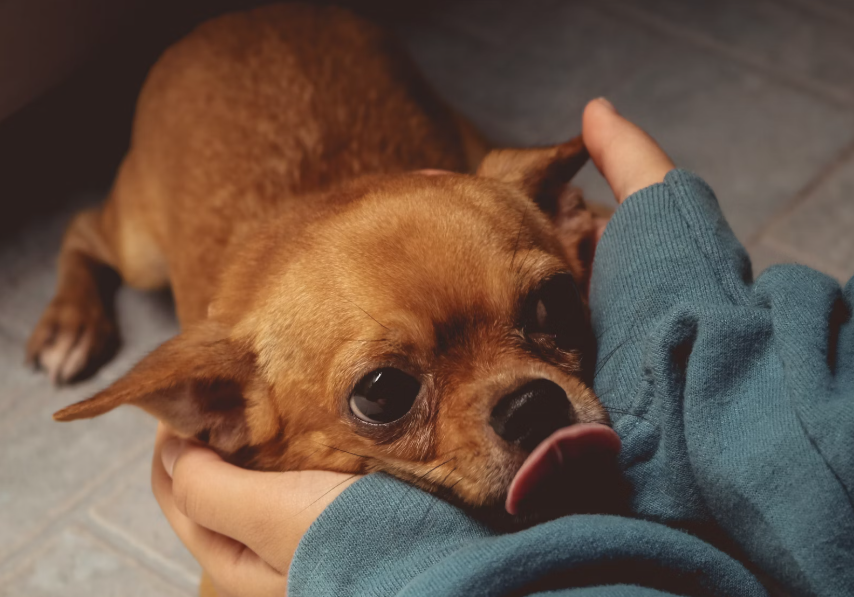
What Should You Do When Your Dog Licks Your Face?
When your dog licks your face, it’s usually a sign of love, affection, or a gentle reminder to give them your attention. It’s one of the many ways dogs communicate with us and bond.
However, while face-licking can be an adorable way to display affection, there are some situations when you may want to set boundaries or discourage the behavior. For example, if your dog’s licking becomes excessive, it could be a sign of anxiety or stress, which may require more attention or training.
Additionally, if your canine’s licking is interrupting daily life, leading to irritation, or becoming compulsive, you may need to consult a vet or trainer.
It’s essential to always make sure that your dog is healthy and up-to-date with all the necessary vaccinations if they are licking your face. Dogs' mouths can carry bacteria, and while most of it isn't harmful to humans, you may want to avoid the risk of getting sick. And if your dog has a bad breath, yogurt can help!
So, the next time your paw friend licks you to show affection, you may want to return the affection with a belly rub or a scratch behind the ears—your dog will appreciate it!




